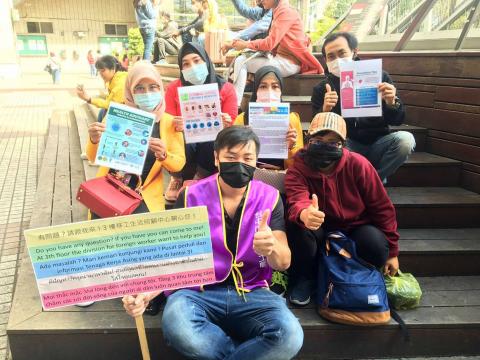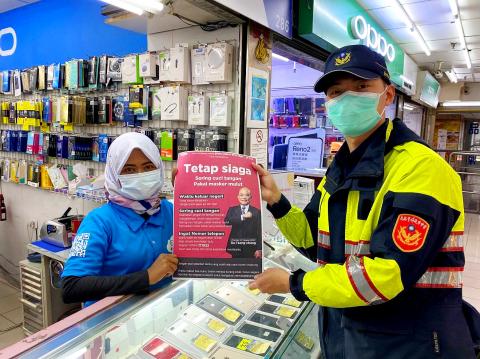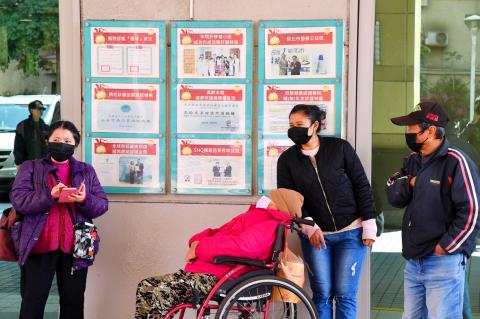A Vietnamese migrant fisherman squeezes into his tiny bunk, picks out a bed bug and shows it to Father Gioan Tran Van Thiet. Usually Tran would be thinking of how to get the workers out of these squalid and cramped boat cabins, for which they pay up to NT$5,000 a month in “lodging fees.” But he now has additional concerns with the outbreak of COVID-19.
Tran, a Vietnamese priest who runs the Migrant Workers’ Concern Desk at St Christopher’s Church in Taipei, was in Yilan on Feb. 15 handing out face masks, jackets and sweaters to the migrant fishermen. He acknowledges, however, that these measures won’t help if a fisher becomes infected with the coronavirus because they typically live in overcrowded spaces.
“The mask is minimum protection and makes them feel safer, but real prevention is to give them better living conditions,” Tran says.

Photo courtesy of Taichung City Government
NGOs are concerned that Taiwan’s 700,000-strong migrant workers, including factory workers, domestic helpers and caregivers, aren’t being given adequate protections against the virus. Concerns revolve around the prevention measures, medical translation and their crowded communal living conditions.
Though the government has made an effort to provide translations of prevention measures, the dissemination of this information is largely left to employers and brokers. And since the 32nd case of infection involves an illegal migrant caregiver, concerns have been raised about increased societal stigmatization.
“Dealing with this coronavirus has to be the responsibility of everybody, but employers often forget ... and brokers are only concerned about their monthly fee,” Tran says. “We can’t just depend on the government. We need to create an atmosphere where we have to protect ourselves and others as well.”

Photo: Hsu Kuo-shen, Taipei Times
RIGHT TO MASKS
The fishermen are the worst case scenario, but Lennon Wong (汪英達), director of Serve the People Association (桃園市群眾服務協會), says other migrant workers are also at risk. Many caregivers care for the elderly and sick and frequently visit hospitals, while factory workers usually live in close quarters at company-provided dorms.
The government has translated its coronavirus prevention information into Indonesian, Vietnamese, Tagalog and Thai — the languages most commonly spoken by migrant workers — and disseminated it at places the workers are known to frequent, as well as online. It has also called for employers and local officials to make sure adequate information and measures are provided. Those who don’t provide face masks to caregivers, for example, can be fined.

Photo: CNA
But not all employers follow the rules. One of the fishermen Tran visited said he didn’t know there was mask rationing, hearing nothing from his employer and broker.
However, the government response has shown significant improvement since the SARS epidemic in 2003. Taiwan Panorama reported that many migrant workers didn’t know about the epidemic during its early stages. It wasn’t until three caregivers died about three months after the beginning of the SARS outbreak that the government rushed to translate and distribute prevention information. And only then did the Council of Labor of Affairs, which is today the Ministry of Labor, warn employers against firing infected workers and provide quarantine advisories.
Wong first brought up the issue of migrant workers and virus prevention in a blog post earlier this month.
“These problems cannot be brushed off by claiming that it’s the responsibility of the hospital, employers, job placement agencies or brokers, or that these are extreme and unusual circumstances that only affect a few migrant workers,” Wong says. “Migrant workers are living and working in Taiwan and have the right to buy masks when they need it, otherwise it could be a blind spot in virus prevention.”
Most migrant workers do have National Health Insurance (NHI) cards, and thus are technically eligible to queue up for masks at pharmacies — except for fishermen hired outside of the country. This group numbers about 20,000, Wong says, and they are often away at sea. But in the event that one of them has to seek medical help, they’ll need masks to enter clinics or hospitals, which generally don’t provide them.
Also, many brokers and employers keep the workers’ documents, and even those who have their NHI cards may not have the time to go out and line up for masks due to work demand.
Yanti and Ika, both Indonesian caregivers in Taipei, say that while they don’t have time to queue up for masks, their employers will give them masks when they go out. Many who Tran met, however, are not so fortunate.
CURBING INJUSTICE
And then there is the discrimination. Betty Chen (陳容柔) of the Taiwan International Workers Association (TIWA) says she has heard of migrant workers being angrily accosted by Taiwanese for not wearing masks in public.
“Societal discrimination toward migrant workers still exists. Why don’t they ask other Taiwanese who don’t wear masks, or [Westerners]? The migrant workers don’t even have time off to go get the masks, and many don’t even know where to get them. Some who visit us say they’ve been using the same one for over a week.”
Concerns over increased discrimination against migrant workers have been growing since the nation’s 32nd case of infection was confirmed on Wednesday to be an illegal Indonesian caregiver. According to a CNA report, as of last year there were an estimated 50,000 illegal migrant workers in Taiwan.
NGOs such as TIWA and Medpartners have stressed that these people usually become illegal after escaping abusive working conditions, and increased scrutiny will only make them more afraid to seek medical help if they show symptoms.
“The issue of illegal migrants is nothing new, and we can reflect and discuss solutions systematically after the outbreak is over,” Medpartner states on its Facebook page. “Please, do not stereotype migrant workers now.”
Wong says the government should at least try to reach out to illegal workers as they are usually found in certain areas such as remote farms.
“The government cannot just catch them all, because the agricultural industry needs them,” he says. “But they know which areas they are concentrated in, and they should contact local public health officials and at least provide some preventive measures.”
QUARANTINE QUESTIONS
Like Tran, Wong is concerned about what would happen if a migrant worker living in a crowded dorm is infected.
“How do you quarantine them in that case?” Wong asks. “Most factories don’t have space to contain just one person. How do you provide a suitable place for them, with adequate counseling and care while preventing the employer from firing them? We need to be prepared for the worst case scenario.”
Chen echoes these concerns.
“This is a huge question mark,” she says. “If it’s home-quarantine, what counts as a home? The entire dorm? Or a section of the dorm? The government will probably ask the employers and brokers to do it, or threaten them with fines... It’s convenient [for the government] to place all responsibility on the employers and brokers.”
There is evidence that the government is drawing attention to the plight of migrant workers — albeit without much concrete plans. Last week, Nantou public health staff visited the Nangang Industrial Park (南崗工業區), which employs about 4,500 migrant workers, and urged factories to provide one quarantine room per dorm in case of suspected infection. They also ordered employers to improve existing living conditions and promised to check back in the future.
“The government can’t just ask the employers and brokers to take full responsibility,” Wong says. “This virus is beyond the average person’s capabilities to handle.”
Tran says they have been calling for better living conditions for the fishermen for years, but not much has changed. The only solution is to keep exposing the issue and keep pushing, he says.
“When the [Nanfangao] bridge collapsed [in October last year], they promised to give better dorms for the fishermen,” he says. “We haven’t seen anything.”

Taiwan has next to no political engagement in Myanmar, either with the ruling military junta nor the dozens of armed groups who’ve in the last five years taken over around two-thirds of the nation’s territory in a sprawling, patchwork civil war. But early last month, the leader of one relatively minor Burmese revolutionary faction, General Nerdah Bomya, who is also an alleged war criminal, made a low key visit to Taipei, where he met with a member of President William Lai’s (賴清德) staff, a retired Taiwanese military official and several academics. “I feel like Taiwan is a good example of

March 2 to March 8 Gunfire rang out along the shore of the frontline island of Lieyu (烈嶼) on a foggy afternoon on March 7, 1987. By the time it was over, about 20 unarmed Vietnamese refugees — men, women, elderly and children — were dead. They were hastily buried, followed by decades of silence. Months later, opposition politicians and journalists tried to uncover what had happened, but conflicting accounts only deepened the confusion. One version suggested that government troops had mistakenly killed their own operatives attempting to return home from Vietnam. The military maintained that the

Jacques Poissant’s suffering stopped the day he asked his daughter if it would be “cowardly to ask to be helped to die.” The retired Canadian insurance adviser was 93, and “was wasting away” after a long battle with prostate cancer. “He no longer had any zest for life,” Josee Poissant said. Last year her mother made the same choice at 96 when she realized she would not be getting out of hospital. She died surrounded by her children and their partners listening to the music she loved. “She was at peace. She sang until she went to sleep.” Josee Poissant remembers it as a beautiful

Before the last section of the round-the-island railway was electrified, one old blue train still chugged back and forth between Pingtung County’s Fangliao (枋寮) and Taitung (台東) stations once a day. It was so slow, was so hot (it had no air conditioning) and covered such a short distance, that the low fare still failed to attract many riders. This relic of the past was finally retired when the South Link Line was fully electrified on Dec. 23, 2020. A wave of nostalgia surrounded the termination of the Ordinary Train service, as these train carriages had been in use for decades